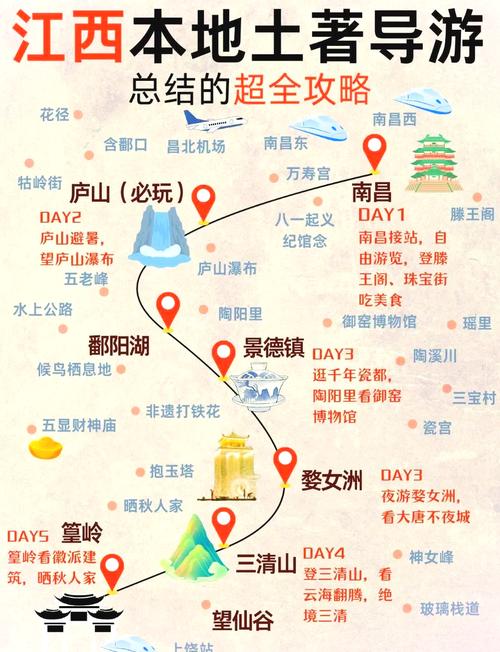南昌 → 庐山自驾游全攻略
庐山,以其雄、奇、险、秀闻名于世,是“匡庐奇秀甲天下”的名山,从南昌出发,自驾前往庐山非常便捷,是感受庐山壮丽风光和深厚文化的绝佳方式。

(图片来源网络,侵删)
行前准备与须知
-
车辆选择:
- 庐山盘山公路弯多路陡,对车辆有一定考验,建议选择动力较好、底盘较高的SUV或轿车,如果选择在山上住宿,车辆可以停放在酒店停车场,非常方便。
- 注意: 山上加油站较少,建议在进入庐山山门(如“北门”或“南门”)前加满油。
-
门票与交通:
- 门票: 庐山风景区门票为 160元/人(有效期5天),60-69岁老人、学生等凭证件可享受半价优惠,1.4米以下儿童、70岁以上老人免票。
- 观光车: 这是必买的!进入景区后,私家车不能随意开上各景点之间的公路,必须乘坐景区观光车,费用为 90元/人(往返,5天内有效),观光车线路覆盖了所有主要景点,非常方便。
- 提前预约: 建议通过“庐山风景区”官方微信公众号提前预约门票和购买观光车票,尤其是在节假日,可以节省排队时间。
-
住宿选择:
- 山上住宿: 优点是节省时间,可以方便地看日出日落,夜游牯岭街,缺点是价格相对较高,选择面较窄。
- 牯岭街: 山上的中心,餐饮、购物、娱乐最集中,是住宿首选区域。
- 山下住宿: 优点是选择多,性价比高,缺点是每天都需要上下山,比较耗时。
- 牯岭镇(山上)
- 星子县/九江市(山下)
- 山上住宿: 优点是节省时间,可以方便地看日出日落,夜游牯岭街,缺点是价格相对较高,选择面较窄。
-
最佳旅游时间:
 (图片来源网络,侵删)
(图片来源网络,侵删)- 春季(3-5月): 春暖花开,云雾缭绕,是赏景的好时节。
- 夏季(6-8月): 避暑胜地,平均温度比山下低7-8℃,是庐山的旅游旺季。
- 秋季(9-11月): 天高云淡,层林尽染,秋色迷人。
- 冬季(12-2月): 银装素裹,是赏雪、拍雾凇的好时候,游客较少,较为清静。
自驾路线规划
从南昌出发,上高速前往庐山,主要有两条路线:
-
路线一(最常用,走北门):
- 南昌 → 福银高速(G70) → 沙河/德安出口下 → 省道S213 → 庐山北门(莲花林收费站)
- 车程: 约1.5 - 2小时。
- 特点: 路线最直接,是大多数游客的选择,此路线可到达庐山北门,是前往牯岭镇和大部分景点的入口。
-
路线二(走南门,可顺路游览秀峰):
- 南昌 → 梨温高速(G6011) → “星子/庐山南”出口下 → 国道G105 → 庐山南门(秀峰收费站)
- 车程: 约2小时。
- 特点: 此路线可以顺路游览“庐山之美在山南”的秀峰景区(李白诗“望庐山瀑布”所在地),如果时间充裕,可以安排一天游览山南景区。
经典行程安排(3天2晚)
这个行程覆盖了庐山最精华的北山和南山景区,节奏张弛有度。

(图片来源网络,侵删)
Day 1: 南昌 → 庐山北山景区 → 牯岭街 → 日出
- 上午: 从南昌出发,走路线一前往庐山北门,抵达后,凭预约信息购买门票和观光车票,乘坐观光车上山。
- 中午: 抵达牯岭镇,先办理酒店入住,然后解决午餐,可以品尝一下庐山特色菜,如石鸡、石耳、石鸡炖火腿等。
- 下午: 游览小天池(电影《庐山恋》取景地,可眺望牯岭全景)→ 望江亭 → 牯岭街(山上最繁华的商业街,可以逛逛特产店,买些云雾茶)。
- 傍晚: 前往如琴湖和花径公园,欣赏湖光山色,漫步林间小道,这里也是拍摄日落的好地方。
- 晚上: 在牯岭街品尝晚餐,感受山上的夜生活,早点休息,为明天看日出养精蓄锐。
- 可选(次日清晨): 前往含鄱口或望江亭观看壮丽的日出。
Day 2: 核心景点一日游(经典西线)
- 上午: 乘坐观光车前往“三叠泉”站,这是庐山的王牌景点,徒步下到谷底,感受“匡庐瀑布,首推三叠”的磅礴气势,再爬上来,是对体力的考验,但绝对值得。
- 中午: 在三叠泉附近简单用餐或返回牯岭镇用餐。
- 下午: 乘坐观光车前往“五老峰”站,徒步游览五老峰和三叠泉之间的“植物园”,这里是天然的氧吧,可以近距离接触各种珍稀植物,之后前往“芦林湖”和“庐山博物馆”(原“庐林一号”毛主席旧居),了解庐山的人文历史。
- 傍晚: 乘坐观光车前往“美庐别墅”和“周恩来纪念馆”,感受近代风云人物的足迹,之后可以步行至“牯岭街”。
- 晚上: 在牯岭街自由活动,找一家小酒馆或咖啡馆放松。
Day 3: 山南风光 → 返回南昌
-
方案A(经典山南线):
- 上午: 从牯岭镇乘坐观光车前往“南山索道”站,乘坐索道下山(也可选择徒步,但耗时较长),下山后,游览“秀峰景区”,欣赏李白诗中描绘的“飞流直下三千尺”的庐山瀑布,参观“开先寺”遗址和“龙潭”等景点。
- 中午: 在星子县城或秀峰景区附近品尝农家菜。
- 下午: 驾车沿路线二返回南昌,途中可以顺路去看看“白鹿洞书院”(需另购票),感受千年学府的文化底蕴。
-
方案B(休闲返程):
- 上午: 在牯岭镇睡个懒觉,逛逛之前没来得及去的小店,买些伴手礼(如云雾茶、笋干、庐山石鸡罐头等)。
- 中午: 品尝一顿丰盛的午餐后,开始驾车沿路线一返回南昌。
美食推荐
- 庐山石鸡: 一种蛙类,肉质细嫩,清蒸或红烧皆可,是庐山“三石”之首。
- 庐山石鱼: 产于溪流中的小鱼,无骨无刺,可用来炖汤或做羹,味道极其鲜美。
- 庐山云雾茶: 中国十大名茶之一,产于高寒多雾的山区,口感醇厚,回味甘甜,在牯岭街有很多店铺可以买到,记得货比三家。
- 萝卜饼: 山上常见的小吃,外酥里嫩,萝卜丝馅,咸香可口。
- 石耳炖鸡: 营养价值极高的滋补汤品。
注意事项
- 天气多变: 庐山天气说变就变,务必随身携带雨具和一件薄外套,即使是夏天。
- 安全第一: 盘山公路弯急坡陡,请谨慎驾驶,不要超速,步行游览时,也要注意脚下安全,尤其是在三叠泉等湿滑路段。
- 穿着舒适: 一定要穿一双舒适的运动鞋,因为全程需要大量步行。
- 错峰出行: 尽量避开周末和法定节假日,否则人山人海,体验感会大打折扣,如果无法避开,请务必早起。
- 环保出行: 请爱护庐山的自然环境,不乱扔垃圾,将“除了照片,什么都不要带走;除了脚印,什么都不要留下”记在心里。
希望这份攻略能帮助您在南昌和庐山度过一段愉快而难忘的旅程!祝您旅途顺利!




